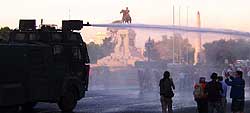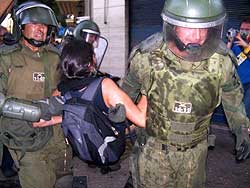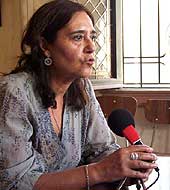



Police Killing of Chile Mapuche Youth Sparks Unrest
By Ben Witte - Monday, 07 January 2008
Human Rights Leaders Protest End Of "Nunca Más" Pledge Made By Concertación Government
 |
Protesters meet with Caribineros hoses at a demonstration this weekend Ben Witte, Santiago Times |
Outraged over last week's police killing of a 22-year-old Mapuche man, activists throughout Chile were in the streets Friday to protest what they say is ongoing state oppression of the country's largest indigenous group.
The largest protests took place in the Region IX capital of Temuco, located some 20 miles north-east of where Universidad de la Frontera agronomy student Matías Valentín Catrileo Quezada was shot dead by police Thursday morning as he and some 30 other Mapuche activists carried out a symbolic land occupation on a privately-owned farm (ST, Jan. 4).
Also in Region IX, home to the country's largest concentration of Mapuches, activists blocked roads and, on a military base in Arauco province, vandalized a small plane and two helicopters. Later that night several Mapuches attacked and burned two trucks near Ercilla, also in Region IX.
Activists also made their presence known in Santiago, where protestors gathered Friday afternoon in front of the La Moneda presidential palace. A much larger demonstration took place several hours later in Plaza Italia, where at least 1,000 people protested peacefully for approximately one hour until an armored Carabineros vehicle attacked the crowd with chemical-laced water cannons. A few protestors retaliated with Molotov cocktails. Police made several arrests.
 |
Caribineros break up the protest in Santaigo Ben Witte, Santiago Times |
"We, as Mapuches, are not going to just calm down. We're got a lot of rage to let out. We're very angry. The state, cowardly and at point blank, killed our brother, who was unarmed," Raul Cariñe of an organization called Meli Wixan Pau (Of the Four Points of the Earth) told members of the international press Friday afternoon.
Meli Wixan Pau and other Mapuche groups are demanding the police officer who alleged fired the deadly bullet on Catrileo be prosecuted to the full extent of the law. Officer Walter Ramírez Espinoza is currently being held in police custody.
In 2005 police killed a 17-year-old Mapuche boy named Alex Lemún. The man who pulled the trigger in that case, Marcos Treuer, was never convicted and continues to work as a member of the Carabineros.
Organizers behind Friday's demonstrations deny initial press reports describing Thursday's deadly incident as a "confrontation" between police and Mapuche activists. Instead, according to Ximena Cumican of the Leftist Mapuche Assembly, it was simply murder.
"The police always claim legitimate self defense. They said it was self defense when they killed (forestry worker) Rodrigo Cisternas (ST, May 7, 2007). They said the same thing as an excuse not to let the country's workers march on Aug. 29 (ST, Aug. 30, 2007). The police are always going to claim self defense, just like they did years ago (during the Augusto Pinochet dictatorship) every time they killed a member of one of this country's leftist organizations," said Cumican.
 |
Mireya Garcia speaks to the press Ben Witte, Santiago Times |
For Mireya Garcia, vice president of the Group of Families of the Detained and Disappeared (AFDD), Catrileo's death is indeed reminiscent of the oppression exercised during the 17-year Pinochet regime (1973-1990). And rather than make good on its promise that "never again" (nunca más) would such atrocities occur in Chile, the current governing coalition is outwardly employing some of those same repressive mechanisms, she said.
"We consider Matias' murder to be an extremely serious matter. It hurts us deeply. We feel that the killing of this young man means that the 'never again' for which we've fought so hard is disintegrating," said Garcia.
"This tears away at the concept that never again would human rights be violated in Chile. This is a violation of human rights. This is the state acting against a people who are legitimately fighting for land that originally and ancestrally belonged to them," the AFDD vice president insisted.
Catrileo's death comes at a time of already heightened tensions in the centuries old struggle between the Chilean state and the country's Mapuche population, which is estimated at more than 1 million.
Last October several Mapuche political prisoners convicted on Pinochet-era terrorism charges initiated a widely publicized hunger strike. The strikers are demanding the liberation of all Mapuche political prisoners. For health reasons, four of the original five hunger strikers have had to give up their prolonged fast. Héctor Llaitul ended his strike just this past Monday. During his 81-day fast Llaitul lost approximately 50 pounds. One of the strikers, however, has kept up the suicidal fast and is now on her 86th day. Despite pleas from doctors and family members that she give up her protest, Patricia Troncoso continues to refuse food. Doctors consider her to be in grave condition.
"It's just horrible. We repudiate the fact that our brothers, these political prisoners, must submit their bodies to this type of pressure in order to get the state to acknowledge our people's demands," said Raul Cariñe.
"What we have is a pseudo-democracy, governed by the Concertación coalition, which has heavily oppressed us over the past 17 years. And it's not just (Michelle) Bachelet that's killed our brothers, members of our community. Alex Lemún was killed during Ricardo Lagos' government. He also has his hands stained with Mapuche blood," Cariñe added.
Source: The Santiago Times